Beth Kephart's Blog, page 209
December 12, 2011
I've Been Getting Older Lately: The She Writes Guest Blog

Not long ago, Rahna Reiko Rizzuto (a novelist, memoirist, teacher, and dear friend), invited me to contribute a post to She Writes, "a community, virtual workplace, and emerging marketplace for women who write, with over 15,000 active members from all 50 states and more than 30 countries." Reiko herself had been invited to spearhead a series of front-page stories called "The Daily Mentor," and you can find her series on the She Writes front page all throughout this week.
I was, of course, more than delighted to contribute. I share my post with you here; it will go up at noon on She Writes. Please check out the entire site and register to join, if you haven't already.
When Rahna Reiko Rizzuto invited me to submit a guest post
for She Writes, I remembered, as I often do, a day Reiko and I once shared in
Manhattan. A long walk. The rocks of Central Park. A story she was telling about the
Hudson River. Turtles. I remembered that day, and then I
remembered all the years before and after, when Reiko and I have been friends. And then I had this thought, small and
essential: None of any of that
would have ever occurred if it hadn't been for books. Because that's how we met, Reiko and I—through the books
we'd been writing, through the books we had read.
I've been getting older lately, and I've been realizing
this: I feel most at peace among
those who recognize the power of books, who work to write or protect or
celebrate them, who value them, who buy them, who will write an email, 4
AM: I've just found a book that I know you will love. Some may see this as an elitist
thing. I see it as anything
but. Lovers of books are lovers of
stories, and stories are foundational, heart-centric, core.
Publishing is hard, full of abrasions and deflations,
unnecessarily brusque, unnaturally confusing—or, I should say, publishing can
be those things. But writing
books and reading them, loving books and sharing them, is a different matter
altogether—it is a peace zone, a shelter.
I will have published fourteen books by the time next summer
rolls around, and what stands out most for me, in all these years, is not the
reviews or the awards or the sales figures (never the sales figures!), but the
community of book lovers, book bloggers, book friends that I have found and
kept, the community that has kept me.
What stands out for me is the walks that I have been privileged to take,
the conversations I have had, the rescue and the shelter, the promise and the
passion, those turtles sunning themselves on those rocks.
Something true and affirming has emerged from it all. Something real, and honest.




Published on December 12, 2011 02:19
December 11, 2011
If I Could Give You This

If I could give you the sound of Vespers within the stone walls of Bryn Mawr Presbyterian Church. If I could give you the ride back to my father's house. If I could give you the pink edge of the sky, or the lawns alight with Christmas.
If.
I can only give you this.




Published on December 11, 2011 14:44
December 10, 2011
Beautifying the Sentence: a contest reminder

In early November, just as the National Novel Writing Month was getting under way, I posted a contest, the gist of which was this: Share with me your best revised sentence, post NaNo, and you'll have a chance to win a copy of either You Are My Only (Egmont USA), which just went into its third printing, or Small Damages (Philomel), which has not been printed yet (but I have a spare handful of galleys). I'll also be posting your work on my blog.
For more details and examples of sentences improved and empowered, please go here.
The contest closes December 20th. The winner will be announced on Christmas Eve.




Published on December 10, 2011 06:40
December 9, 2011
A Little You Are My Only News

I've never been to Brazil, but I have longed to go. For the time being, You Are My Only is going in my stead, thanks to the good work of Amy Rennert and the Jenny Meyer Literary Agency, Inc. Brazilian-Portuguese rights to the book have been sold to Novo Conceito.
You Are My Only also, as many of you know, went into a third U.S. printing this week. For that enormous bit of good fortune, I have the world of generous bloggers and independent booksellers (and of course Darcy Jacobs, of Family Circle) to thank. Thanks today especially to Serena Agusto-Cox, who placed You Are My Only on the D.C. Literature Examiner gift book buying guide. Check out the entire list for some spectacular recommendations from a very fine reader.
I thank you all. From the bottom of my heart, I do.
Many thanks, too, to Elizabeth Law of Egmont USA, for being the bearer of good news.




Published on December 09, 2011 10:27
On Berlin, Re-reading, and Book of Clouds
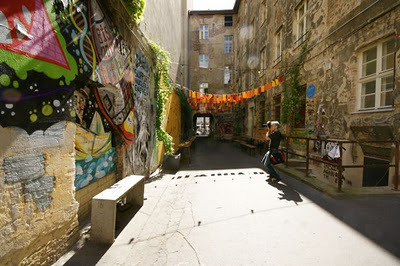
David Bowman has an interesting and timely back-page essay in The New York Times Book Review this weekend. It's called "Read It Again, Sam," and it celebrates books fine enough to be read again. Patti Smith reports on her plan to read again An Episode in the Life of a Landscape Painter. Stephen King professes to having read Lord of the Flies eight or nine times. Bharati Mukherjee reveals that she re-read all of Louise May Alcott at least a half-dozen times at the tender age of 9.
And you?
Earlier this week, while on a plane home from London, I reached for Book of Clouds (Chloe Aridjis), a book I'd read at once upon its release in 2009. It's just the right size for an eight-hour flight (with a nap tucked somewhere in between), and I'd wanted to re-read it because I craved the surreal mood it had engendered within me—the fog, the mist, the strange; I craved the Berlin at the book's heart. How had Aridjis achieved her effects? I would examine this. I would study it.
I had remembered Clouds as a lyric of a book, and indeed extraordinarily beautiful images float throughout. But what was also fascinating to me, upon my second review, is that Aridjis is not tricking her reader with language here; she is never overreaching. Indeed, some of her oddest moments and most surreal, memorable constructions are rendered with thoroughly uncluttered, even straightforward prose—a glorious effect that I had not deconstructed my first time through. So caught up was I in the mood of her Berlin—in the underground worlds, in the residues of a sinister past—that I failed to see that passages like this one, describing an abandoned bowling alley beneath the streets, had been meticulously and not (until the very end) metaphorically put forth. Aridjis gives us the facts. She lets us do with them what we will.
After traversing several dark, damp rooms, plowing ever deeper into the labyrinth, though it was hard to tell how many doorways we'd actually crossed, we arrived at the so-called Gestapo bowling alley, a rectangular room, somewhat larger than the others as far as I could tell. Our guide asked us to fan out so that everyone could see and directed his flashlight at different spots. I stepped out from behind a girl with pigtails and began to look around. It was a pretty chilling sight. Everything, it seemed, was just the way it had been left decades ago. At the center of the room lay a metal contraption, about eight feet long, an obsolete machine once used for spitting out wooden bowling balls, and with its rusty corners and thin bars, it looked, at least from afar, like a medieval instrument of torture, like those racks to which victims were bound by their hands and feet and then stretched.
I would not have known this about Clouds had I not read the book a second time. I would have carried with me a false idea about Aridjis method—a first-blush idea, not a studied one. I loved the book even more the second time I read it through. I loved it, though, for somewhat different reasons.
Always, in perpetuity, Clouds will be a signifier for me—a book that in large part sent me to Berlin this past summer, a trip that subsequently led to my own work on a new (and very different) book set in that city for the beautiful Tamra Tuller of Philomel. Without Clouds, I would not have taken that trip, in other words. Without Clouds, I would not now be sitting here, surrounded by books and films about Berlin's past. This was a book that had deserved a second reading. Most good books do.




Published on December 09, 2011 05:37
December 8, 2011
happiness immemorial

"You look happy," I told a friend yesterday. We were at the dance studio, a dark storm lashing against the window glass.
"Of course," he said.
I asked him why, half a joke, a plea for sun on a rumbling day. He began (it was easy for him) to enumerate. Youth was on his list. Health. Love. Opportunity. Dance. Not riches, he said. He wouldn't want riches. Riches wouldn't make him happy.
A little girl came in, next to dance. She put on her shoes, he bowed to her, they walked down the hall, arms linked together. I went out into the storm and for the rest of that night, my friend's happiness was mine, his celebration of what we have right now, this moment.




Published on December 08, 2011 07:02
December 7, 2011
Christmas in London, then home




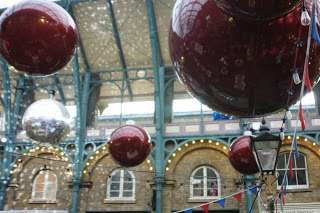


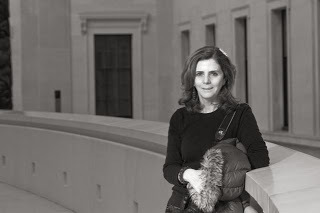

We went from place to place, as fast as we could. We loved our time with family. I stopped for no scene, calibrated nothing, just lifted my camera above the crowds and shot, trying to freeze the color. At the British Museum, on the last day, we stopped and paused and stood. On the flight home I studied the skies and feared that all the color would be lost, remembered the state of the house as we had left it — Christmas packages high in one corner, but not a light, not the smell of pine, no Santa or ornament or bell.
My sister, though, had thought ahead for me. There was a package by the door, tall and skinny. There was a tree inside, lights, wooden ornaments. There was, in other words, Christmas. I set to work and there it stands—by the window where I work, subverting gray weather.




Published on December 07, 2011 07:51
Jill Lepore and the electrifying evening
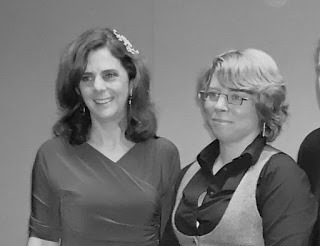
I'd like to use the word "electrifying" in the following post. I'd like to use it several times.
Because that's the word that kept coming to mind throughout our time with Jill Lepore, who last evening graced Villanova University as the third speaker in The Lore Kephart '86 Distinguished Historians Lecture Series. If I had allowed myself to wonder, theoretically, how one young woman could have already achieved so much in life—she's a professor of American History at Harvard and one of my very favorite writers at The New Yorker; she's published books on topics ranging from the Tea Party to the origins of American identity; she's gone to Dickens camp and read 38 volumes of original Ben Franklin; her work has won the Bancroft Prize and been a finalist for the Pulitzer; she's even co-authored a novel—I stopped wondering two minutes after she walked into the room. The answer is pretty basic, pretty simple: Jill Lepore doesn't waste an ounce of her intellect on posturing or presumption. Her enthusiasm is equal to her intelligence. Her facility with language, structure, theme is all in rather happy accordance with her capacity to sleuth her way toward truth.
She was extraordinary last night. She was—here it comes—electrifying as she spoke about Jane Franklin, Ben Franklin's sister and truest correspondent (for more on the topic, please click here). My mother would have loved Jill Lepore. She would have sat there as I sat there, on the edge of a seat in a crowded room, happy to be in the company of one that exhilarating, that engaged.
There are so many who make an event like this happen. I'm particularly grateful to my friend Paul Steege, a Villanova University associate professor of history who sits on the speaker selection committee, to Diane Brocchi, to Father Kail Ellis, to Marc Gallicchio, and to Adele Lindenmeyr. And of course, none of this would be possible without my father, Horace Kephart, who had the foresight to create this lecture series in memory of the woman he loved.




Published on December 07, 2011 02:37
December 6, 2011
My interview with Pamela Paul, the NYT children's book editor
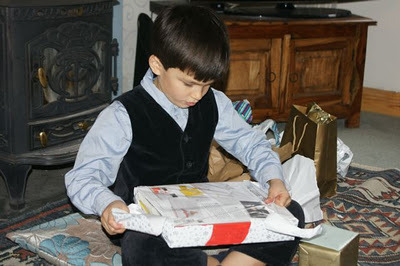
We'd been in London until late last night, celebrating the christening of this enormously special little boy. Among the packages we'd carried with us was this beguiling deluxe pop-up version of The Little Prince, the Antoine de Saint-Exupery story that has never lost its magical glean. (We also brought Felix The Man in the Moon, the gorgeous new book by William Joyce.)
Pamela Paul, who was named the fifth children's book editor at the The New York Times earlier this year, has an innate understanding of the importance of books made for children and has radically transformed their coverage since taking on the role. I began to notice the changes some time around April. The conversation was deepening. The reportage was growing broader. There was more children's book talk, not just on the weekend, but during the week. Melissa Walker was having her New York Times Book Review moment. We were being treated to behind-the-scenes conversations that I found frankly thrilling. There were more back-page essays exploring the influence of early books on readers. Who, I wondered, was behind all this? What magic was she working behind the scenes? What else could the rest of us expect to see as the weeks and months went on?
A few weeks ago, Pamela Paul graciously agreed to a conversation about this and more for Publishing Perspectives. I'm honored today to share that conversation with you and to suggest that our future is in extraordinary hands.
To read my other pieces for Publishing Perspectives, please click on these links:
Success is when the world returns your faith: My conversation with editor Lauren Wein
Between Shades of Gray: The Making of an International Bestseller




Published on December 06, 2011 03:12
December 5, 2011
the two-book deal with Philomel

It is with tremendous happiness—and a sense of terrific good fortune— that I share the news that I will again be working with Philomel on two new books, a deal that was announced earlier today in both Publishers Weekly and Publishers Lunch. My experience throughout the editing and pre-launch of Small Damages (due out July 19, 2012) has been unparalleled. My respect for Tamra Tuller (my editor), Michael Green (Philomel president), and indeed the entire Philomel team—and author list—cannot be quantified. My appreciation for their kindness and care, their intelligence and wisdom, and their faith in me is unspeakable.
It is a remarkable thing to be believed in by people this smart and this good.
Here is the deal as Publishers Lunch noted it earlier today. My thanks to my agent Amy Rennert for helping to make this happen, and for being there through all the years.
National Book Award finalist and author of more than a dozen books including the new YOU ARE MY ONLY and the forthcoming SMALL DAMAGES, Beth Kephart's two untitled novels, the first of which introduces a teenage graffiti artist living in Berlin in the early 1980s on the eve of a daring escape, to Tamra Tuller at Philomel, by Amy Rennert at the Amy Rennert Agency (World).




Published on December 05, 2011 19:05



